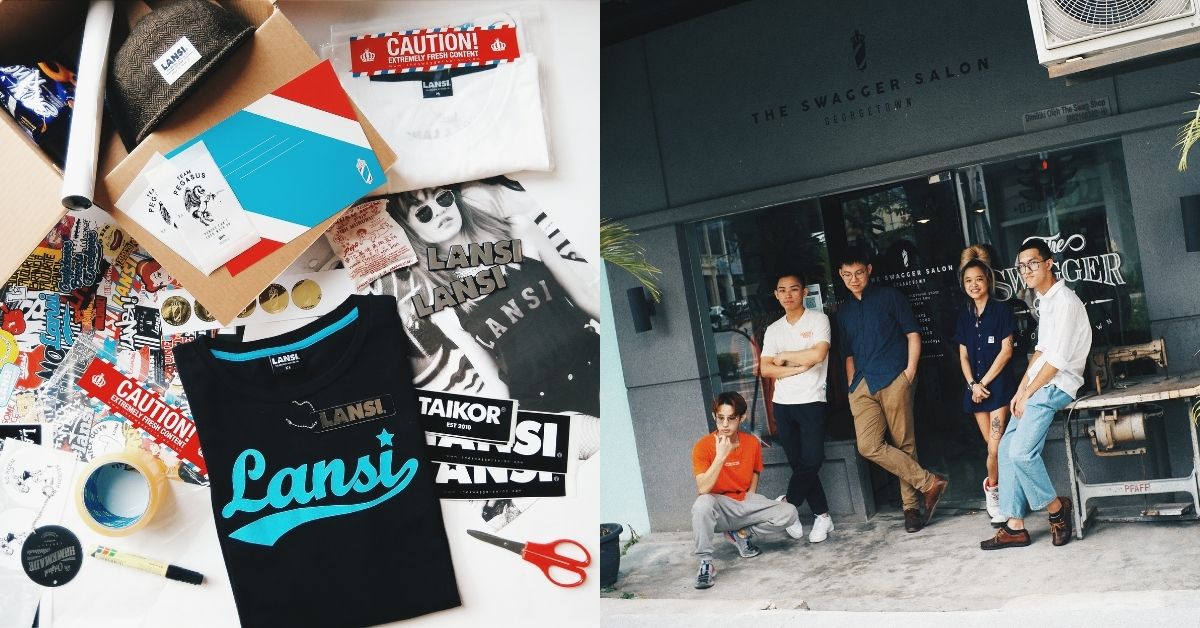Not everyone has the privilege of having a solid capital to launch a startup.
Fortunately, there are many ways to go about that, like looking for investors or simply saving up from jobs.
Shen personally emptied his savings of RM5,000 to venture into his first startup, LANSI in 2009.
A huge chunk of that amount even came from his PTPTN loan.
With the RM5,000 he had, he made 300 caps in 4 different colours with the brand LANSI on them during his final semester of university.
Scribbling the word “Lansi” onto his blank trucker cap one day was what sparked the idea of his own streetwear brand.

At the time, Shen wasn’t even sure if his caps would sell, but if they didn’t, he told himself he’d just get a full-time job after graduation.
“I ended up working full-time immediately after I graduated at an advertising agency as a designer while all my caps sat in the corner of my rented room…for almost a year!” he said.
But that wasn’t the last we would see of those LANSI caps.
Marketing The Lansi Way
In the beginning, Shen struggled with getting local streetwear boutiques to carry and sell his caps.
The stores were only interested in international brands back then.
So, Shen tried a little trick on Facebook to get his caps out there.
He created a Facebook group and named it “If 5,000 people join this group, I will tattoo LANSI on my body“.
Pretty ballsy, and not quite your standard brand marketing. Surely enough, he gained 3,000 followers in 2 weeks.
However, Shen wasn’t actually going to go through with the clickbait he set up.
“I did a sneaky switcheroo and changed the group name to just LANSI and posted pics of my first LANSI caps in the group.”
“That’s how I sold my first cap to a stranger (we met up at Low Yat Plaza)—through that group,” Shen explained.
While some may have been disappointed over the clickbait, people actually started ordering his LANSI caps through the group.

Shen didn’t even wait to break even with his first batch of caps before reinvesting the revenue into making t-shirts and a second batch of caps.
With the increasing demand, the odds were finally with LANSI and his startup took off from there.
Being Less Lansi & More Real About The Biz
Shen predicted that the hype around the LANSI brand would die down eventually, so he started The Swagger Salon in 2010.
The Swagger Salon served as an online streetwear store and a proper e-commerce platform to process their transactions.
Shen’s friends, Jason and Jian, helped him with establishing The Swagger Salon at first but didn’t want any share from it as they didn’t want their friendship jeopardised due to business.
When the caps sales were not going anywhere in the beginning, Shen worked full-time as a designer and copywriter at an advertising agency.
Even when his brand became more popular after that Facebook trick, he knew well enough to stick around with his full-time job instead of going rogue like he did before.
However, 4 years into The Swagger Salon, Shen realised that juggling the business and work became stressful and time-consuming.
This led him to quit his job in 2013 for his business.
In 2014, The Swagger Salon’s flagship store was born in Shen’s hometown, Penang.

To Shen, this was an ode to the cool t-shirt shops he and his high school friends used to hangout at after school and on weekends.
Staying Out Of His Comfort Zone
Since the RM5,000 PTPTN loan, Shen has never taken in any investors nor partners.
Though he finally has a streetwear boutique, he isn’t stopping there.
Shortly after their flagship store was launched in 2014, GST kicked in and affected their cash flow as it changed consumer spending behaviours.
They faced rough patches from 2015 to 2016.
However, this drawback pushed Shen to tap into a completely different industry: cocktail mixology.
Seeing that it was a growing trend and they had some space at the back of their clothing store, Shen set up a speakeasy cocktail bar in 2016 called The Backdoor Bodega.

So on weekends, Shen would be in the store in the afternoons and evenings, and selling pins and making cocktails at the speakeasy in the night.

Their monthly revenue these days ranges averagely between RM35,000 to RM50,000.
Almost 50% of that comes from their cocktail bar, whose revenue is pretty consistent.
While the bar has not been in operation since MCO began, they launched an online store for it to deliver their cocktails and sell pins.
Fortunately, their online clothing sales and third-party clothing production is still steady in spite of the lockdown.
Buying Local Is A Two-Way Street
While penetrating the international market may be the target that many streetwear brands set for themselves to achieve, Shen wants to do the exact opposite.
He believes that buying and supporting local brands is a two-way street.
“If we want to rave about how consumers should support local brands, local brands should also look towards growing and contributing locally as well.”
“Produce and collaborate locally instead of outsourcing, and focus on the local consumer market instead of looking past them and trying to appeal to an international market,” he said.
Being a brand that’s constantly growing, it’s no wonder that Shen isn’t satisfied with a streetwear store alone.
“I believe in building The Swagger Salon Georgetown beyond just a clothing store but also as a community centre of sorts.”
He wants to start hosting mini rap battles, collaborate with the art scene, and raise the standards and appreciation for the local design community.
“If there’s anything that this pandemic and lockdown has taught us, it is that it’s the very people around us who will support us — and will need our support, the most during these trying times.”
Shen, founder of LANSI and The Swagger Salon
Featured Image Credit: Shen, Founder of The Swagger Salon









